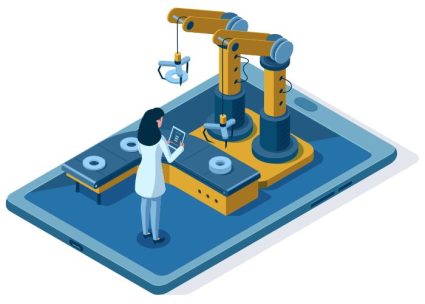An Introduction to Automation Engineering

An introduction to automation engineering
Automation engineering is an exciting and rapidly growing field that is essential for the advancement of modern technology. It involves the use of automated systems to drive processes and manage operations.
Automation engineering takes into account the various components of a system, from software and hardware to networking and data management. It also includes the development and implementation of control systems, such as robotic machines and automation software.
Automation engineers ensure that the systems they design and build are reliable, efficient, and cost-effective. With the right training and education, anyone can pursue a career in automation engineering and help to shape the future of technology.
What is automation engineering?
Automation engineering is the technological process of designing and building automated systems that can monitor and control various industrial processes. It includes elements from computer engineering, electrical engineering, and mechanical engineering.

Automation engineering is used in a wide range of industries, including aviation, food and beverage, and healthcare. Automation engineers design, develop, and maintain automated systems to streamline operations and ensure high-quality products.
A common example of automation engineering is an assembly line in a factory. The production process can be automated with robotics, sensors, and software that manage and monitor the process. Automation engineers are responsible for the design and integration of computer systems and software, as well as the hardware that drives the automation. They use algorithms, networks, and computer languages to program and operate machines and automation systems.
The importance of automation engineering
Automation engineers are responsible for designing, building, and maintaining automated systems. For example, automation systems can perform many tasks, from manufacturing to controlling heavy machinery.

Automation engineers are crucial for the development and manufacturing of new products, including cars and airplanes. Without automation engineers, we would not be able to make the same complex products at the same scale or speed as we do today.
Automation engineers also help to reduce costs of production by reducing waste and improving efficiency. They also contribute to the field of artificial intelligence. For instance, they can build systems that can learn and make decisions based on the data collected by sensors.
Automation engineers help to ensure that our critical infrastructure, such as telecommunications and energy, is secure and reliable. They also can improve safety at an airport or in a healthcare environment.
Areas of expertise for automation engineers
Here are several areas of expertise for automation engineers:
Other areas of expertise in automation engineering
Other areas of expertise in automation engineering include electrical engineering, mechanical engineering, and network engineering.
Education and training requirements
Automation engineers come from a variety of educational backgrounds and have different skill sets. A bachelor’s degree in engineering, computer science, or a related field is generally required for entry-level positions in the field. Many large companies require engineers to have a master’s degree. Some engineers may even pursue a Ph.D. for more advanced and applied research.
Most engineers need to be certified in the engineering field in which they specialize. This shows potential employers that they have the required education and training to do the job and meet industry standards. For those who want to enter the field of automation engineering, a bachelor’s degree is usually enough to get started.
Most entry-level positions require a bachelor’s degree in any engineering field. However, it is important to note that some companies may require engineers to have a degree in computer engineering or electrical engineering.
Career paths in automation engineering
Here are some of the different career paths that at available in automation engineering:
Systems engineer – Systems engineers are responsible for managing the design, development, and operation of automation systems. They must be able to understand how the whole system works, from hardware to software. They are in charge of designing the software and hardware architecture of the system and making sure it works according to the design. Systems engineers must be able to write code, design software, and understand how it all works together. They may use computer-aided design (CAD) software to design the system and simulation software to test it before it is implemented. Systems engineers must be able to manage a team of engineers and technicians to make sure the system is implemented and maintained.
Project engineer – Project engineers are responsible for managing a single project from start to finish. They develop the project scope, define the goals and objectives, and manage the project team. Project engineers are responsible for meeting deadlines and managing expectations. They must be able to design and build prototypes and pilot projects in order to test the functionality of systems and meet project goals.
Product engineer – Product engineers are responsible for managing production and quality control for a product or system. They oversee the production and design teams to make sure that the product is built to standard and meets quality requirements. Product engineers are responsible for managing the development of new product features, including testing and debugging prototypes.
How to stand out as an automation engineer
Automation engineers are responsible for designing and maintaining automated systems. In order to stand out as an automation engineer, you must be able to demonstrate your ability to apply engineering principles to real-world problems.
Engineering is a creative field. It is also a very collaborative field that requires effective communication and collaboration. You must be able to communicate clearly and work well with others.
